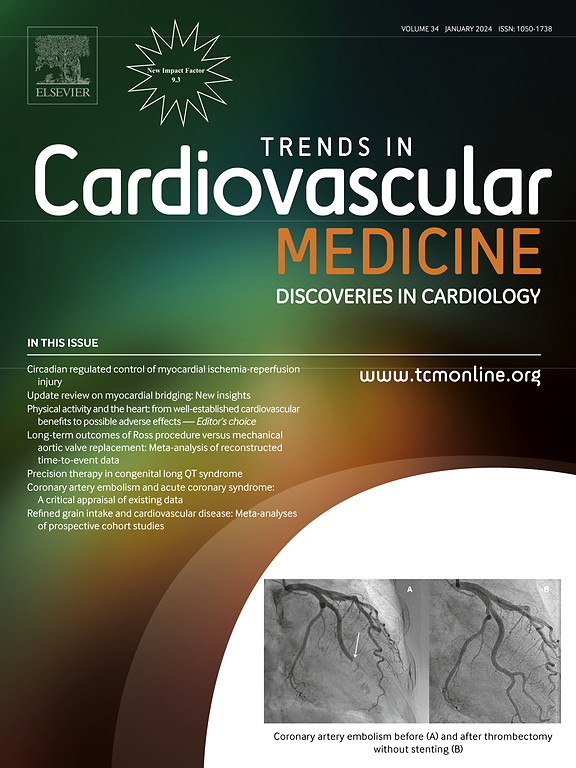芬芬酮在心力衰竭中的作用。
IF 9
2区 医学
Q1 CARDIAC & CARDIOVASCULAR SYSTEMS
引用次数: 0
摘要
心力衰竭伴射血分数轻度降低或保留(HFmrEF/HFpEF)约占所有HF病例的一半,但治疗选择有限。醛固酮引起的矿化皮质激素受体(MR)过度激活一直被认为是血管炎症、心脏纤维化和心脏肥厚的关键驱动因素,这些病理生理过程是HFmrEF/HFpEF发生和发展不可或缺的一部分。非甾体MRA finerenone具有独特的药理学特征:有效和选择性的MR阻断,降低脱靶激素相关副作用的风险。在慢性肾脏疾病和2型糖尿病患者中进行的大型、多中心随机安慰剂对照试验(FIDELIO-DKD、FIGARO-DKD)首次强调了芬烯酮的心肾益处,包括减少心血管原因导致的死亡和心衰住院。最近,finhearts -HF试验将这一证据基础扩展到HFmrEF/HFpEF患者,显示HF事件恶化和心血管原因死亡的风险显著降低。正在进行的研究,如REDEFINE-HF、CONFIRMATION-HF和FINALITY-HF,将通过广泛的射血分数和不同的临床环境来研究芬烯酮在HF中的潜在作用。本综述综合了支持芬烯酮作为心衰治疗新选择作用的不断发展的证据。本文章由计算机程序翻译,如有差异,请以英文原文为准。
The role of finerenone in heart failure
Heart failure (HF) with mildly reduced or preserved ejection fraction (HFmrEF/HFpEF) represents approximately half of all HF cases, yet therapeutic options are limited. Mineralocorticoid receptor (MR) overactivation by aldosterone has long been recognized as a key driver of vascular inflammation, cardiac fibrosis, and cardiac hypertrophy, pathophysiological processes integral to the development and progression of HFmrEF/HFpEF. The non-steroidal MRA finerenone has been developed with a distinct pharmacological profile: potent and selective MR blockade with a reduced risk of off-target hormone-related side effects. Large, multicenter randomized placebo-controlled trials in chronic kidney disease and type 2 diabetes patients (FIDELIO-DKD, FIGARO-DKD) first highlighted finerenone’s cardiorenal benefits, including a reduction in death from cardiovascular causes and hospitalization for HF. More recently, the FINEARTS-HF trial extended this evidence to patients with HFmrEF/HFpEF, demonstrating a significant reduction in the risk of worsening HF events and death from cardiovascular causes. Ongoing studies, such as REDEFINE-HF, CONFIRMATION-HF, and FINALITY-HF, will examine the potential role of finerenone in HF across a broad spectrum of ejection fractions and different clinical settings. This review synthesizes the evolving evidence supporting the role of finerenone as a new option in the management of HF.
求助全文
通过发布文献求助,成功后即可免费获取论文全文。
去求助
来源期刊

Trends in Cardiovascular Medicine
医学-心血管系统
CiteScore
18.70
自引率
2.20%
发文量
143
审稿时长
21 days
期刊介绍:
Trends in Cardiovascular Medicine delivers comprehensive, state-of-the-art reviews of scientific advancements in cardiovascular medicine, penned and scrutinized by internationally renowned experts. The articles provide authoritative insights into various topics, encompassing basic mechanisms, diagnosis, treatment, and prognosis of heart and blood vessel disorders, catering to clinicians and basic scientists alike. The journal covers a wide spectrum of cardiology, offering profound insights into aspects ranging from arrhythmias to vasculopathies.
 求助内容:
求助内容: 应助结果提醒方式:
应助结果提醒方式:


